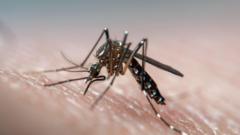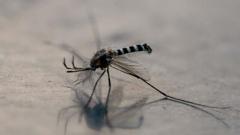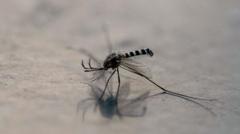Scientists at UC Irvine have developed a groundbreaking method to combat dengue and other mosquito-borne diseases by altering the hearing ability of male mosquitoes, making them ineffective at mating. This research highlights a novel approach to reducing the mosquito population, which is crucial in curbing the spread of numerous viruses that affect millions worldwide.
Innovating Mosquito Control: Genetic Alterations Render Male Insects Deaf to Combat Disease Spread

Innovating Mosquito Control: Genetic Alterations Render Male Insects Deaf to Combat Disease Spread
Researchers are turning to genetic engineering to hinder mosquito reproduction by making male insects deaf, targeting the spread of diseases like dengue and Zika.
In a surprising turn in the battle against mosquito-transmitted diseases, researchers have devised a unique strategy that targets male mosquitoes' ability to hear. By rendering these insects deaf, scientists aim to impede mating activities, ultimately limiting the reproduction of disease-carrying mosquitoes like Aedes aegypti, responsible for spreading viruses affecting around 400 million people annually.
The team from the University of California, Irvine, focused on the Aedes aegypti species, which is known for transmitting dengue, yellow fever, and Zika viruses. Traditionally, male mosquitoes are drawn to female counterparts through sound cues produced by their wingbeats, which they detect while in flight. Understanding this attraction led researchers to explore the possibility of disrupting it genetically.
The team successfully manipulated a genetic pathway linked to the hearing processes in male mosquitoes, specifically targeting a protein known as trpVa. This alteration effectively silenced their auditory perception, resulting in males failing to recognize the sounds of potential mates—they could not make physical contact even after prolonged interaction.
While female mosquitoes are the culprits behind spreading diseases among humans, disrupting their chance to reproduce could significantly reduce mosquito populations. Published in the journal PNAS, the study demonstrated a total failure of mating attempts among mutant males compared to their wild counterparts, who successfully copulated multiple times.
Dr. Joerg Albert, a specialist in mosquito mating behaviors from the University of Oldenburg, acknowledged the study's findings as pivotal. He pointed out that diminishing mosquito reproductive capabilities via auditory disruption presents a promising vector control strategy, but cautioned that careful management and further research are needed. According to him, without the ability to hear and pursue females, male mosquitoes could face extinction.
In tandem with this approach, other preventive strategies are also being considered, including the release of sterile males into areas beset by mosquito-borne diseases. However, it is essential to remember that mosquitoes play significant ecological roles as food sources for various animals and in pollination. Therefore, while innovative techniques emerge to control their populations, researchers must navigate the delicate balance between disease management and ecosystem preservation.







